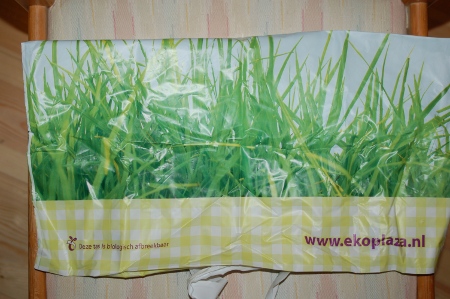In most of Europe we have to bag our own groceries in supermarkets. If we don’t provide our own bags, we need to buy them.
It’s been a battle for some years now. Supermarkets always want to offer free bags as a convenience. They don’t usually like it when customers bring their own backpacks and the like, for fear of shoplifting.
In recent years a number of EU countries have started to impose bag or packaging taxes, presumably in order to further reduce the use of plastics in supermarkets. Now suddenly GMO plastics have started to replace petroleum based plastics, and national governments are beginning to exempt GMO plastics from these taxes, in effect subsidizing their use.
The Netherlands has a tax scheme that strongly favors GMO plastics, taxing them at a lower rate. Germany has exempted GMO plastics from their bag tax completely. In other countries like Ireland, governments are being lobbied to scrap their taxes on GMO plastics.
Here’s a bag I bought from a local supermarket a few days ago:
Notice the logo in the upper corner:
It says ‘This bag is made from corn and fully compostable’. I bought another bag from a natural foods store a few days ago, and it had this on it:
On the bottom is says ‘This bag is biodegradable’. The clerk who sold me the bag said it was made from potatoes.
Is it a coincidence that the only two GM crops approved for planting in Europe are a ‘high starch’ potato and a corn variety? I don’t think so. We’ve been told for years now these two varieties are not destined for human consumption.
For the record I want to say to both Marqt and Ekoplaza that I’m very disappointed they would sell GMOs to their customers in this way, especially as they are not even clearly labelled for what they are. This is a very misleading and dishonest thing to do.
Greenwashing
The argument goes that plastics are a huge environmental problem — so far I guess we all agree. Therefore compostable or biodegradable GMO plastics are better — I guess this is where the agreement ends.
The argument is not unlike how expensive mercury filled bulbs imported from China are supposed to be better for us than cheaper locally made standard light bulbs. The argument is not complete and not accurate.
Netherlands
Here in the Netherlands the argument goes that we are a coastal area, with canals that carry water out to sea. A percentage of litter falls into these canals, and ultimately contributes to the ‘big plastic soup’ in the oceans. What’s missing of course in this argument are actual statistics or studies that show how much this is as a proportion of the plastics in the sea, if there aren’t better ways of managing the problem for example filtering the water as it leaves land, and any sort of proof or explanation as to why GMO plastics are in any way better for the environment.
Certainly, if you as a consumer properly dispose of your waste and don’t throw it in the ocean, the entire argument of GMO plastics being better vanishes.
Compostable or Biodegradable
Biodegradable is a legally defined term, that indicates something will break down into naturally occurring components. Compostable is a looser term, that simply means it will break down into something supposedly harmless, but not necessarily naturally occurring.
In either case, these plastics do not break down at all, except in industrial processes. You can’t compost these plastics at home in your own garden, and there is no guarantee they will breakdown in the environment in any sort of reasonable time frame. Once they do break down, all we have is the word of the manufactures that they will break down into something harmless. In particular, it seems unlikely they would breakdown quickly in the cold dark oceans.
If they are disposed of properly, they are certainly of no added environmental benefit. In a landfill they would still take up the same space as normal plastic, and if incinerated they would also break down in a similar way as ordinary plastic. There are unlikely to be more or better recycling possibilities when compared to ordinary plastic. In fact the presence of even a very small amount of GMO plastic can contaminate a batch of traditional PET or other plastics and undermine recycling efforts.
Agriculture is the Single Most Important Contributor to Climate Change
It’s highly unlikely GMO plastic can be produced with less impact to the environment as ordinary plastic. This is the tiresome argument of biofuels, which take more energy to produce than is in the resulting product.
GMO crops still need chemicals and fertilizers, which are based on fossil fuels and impact the environment.
Labelling
In Europe there are labelling laws requiring the labelling of most GMO foods. Packaging and plastics should not be exempt! Consumers should have the right to choose alternatives.




